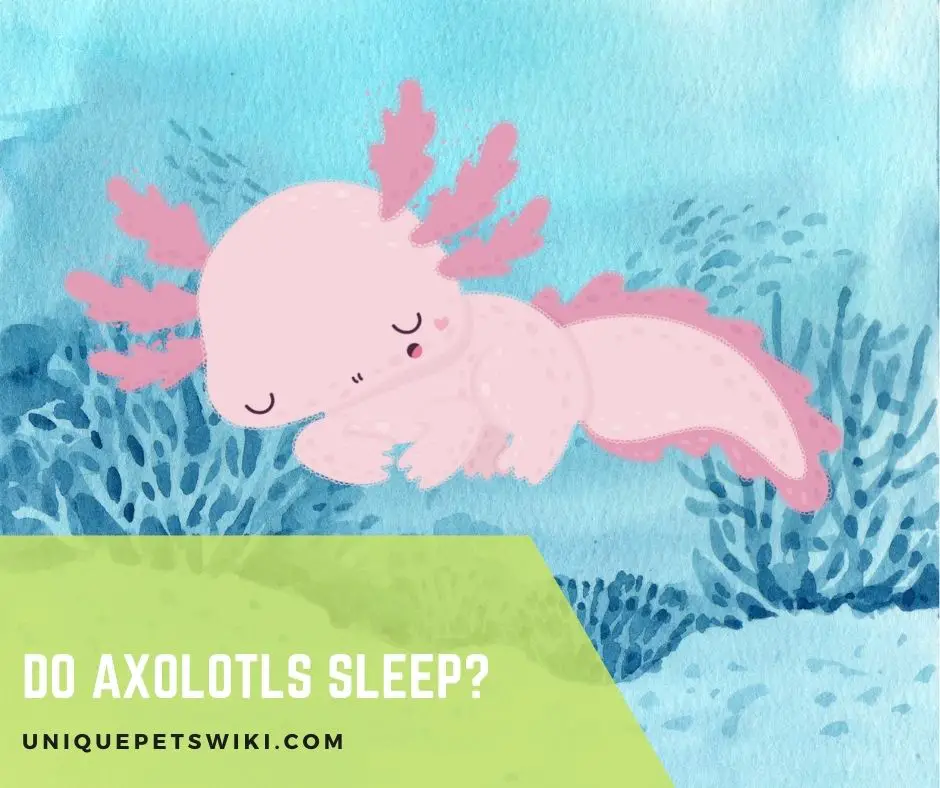Axolotls are amicable, impressive, and interactive aquatic pets that will give many more years of enjoyment if you understand their tendencies, behavior, and traits and if you keep them properly.
Their unique appearance makes them desirable animals to keep in your household. However, you are apprehensive because your axolotls lie dormant at certain times!
To keep Axolotls as a new or inexperienced owner, you need to understand their unique characters, tendencies, and traits to ensure you enjoy having them around you.
I encourage you to read this article since I will enlighten you on normal behaviors for Axolotl, which you will experience, and behaviors that should sound as an alarm for you, sleeping being an example.
Contents
Do Axolotls Sleep?
Yes. Axolotls do sleep. They usually sleep during the darkest periods of the night and also around mid-day
Interestingly enough, they do sleep with their eyes open, so you will find it difficult to tell when or if it sleeps unless you are extra keen on them and able to monitor and understand their behavior and movement.
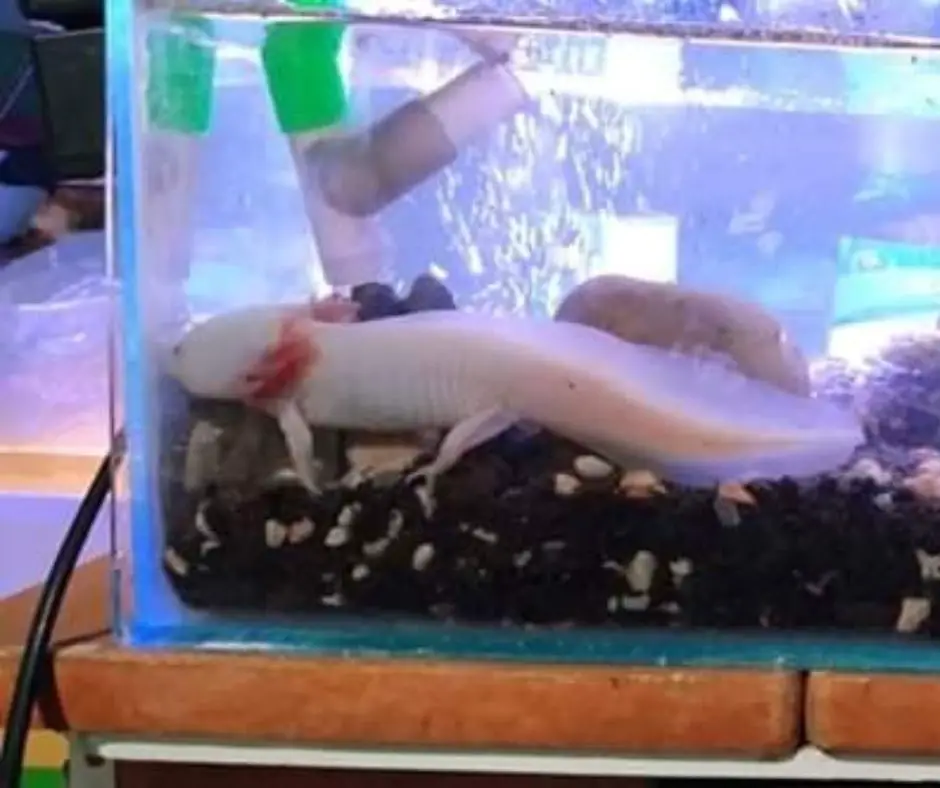
How to Know If Your Axolotl is Sleeping
Telling if your Axolotl is having a snooze, resting, or unhealthy may be cumbersome for you, especially if you’re a newbie in pet keeping.
These animals sleep with their eyes open in addition to other unique traits.
Fortunately, when your Axolotl is sleeping, you will exhibit signs such as pulling back to quiet/calm, safe hiding space and remaining still, slowing its gill flicking frequency, becoming pale in color due to inactivity.
Axolotl Sleeping Habits
The sleeping habits of Axolotl are exciting and exciting since it is unique and it is not similar to other species like human beings, for example.
For instance, it sleeps with eyes open, and during the times you might not be awake or around, that is, usually during the darkest periods of the night, and around mid-day.
As a result, you will need to look for additional clues that will give you a clear indicator when your Axolotl is having a snooze.
Below, I have dug further into more suggestions to address your concerns as the potential owner.
Do Axolotls Sleep at Night?
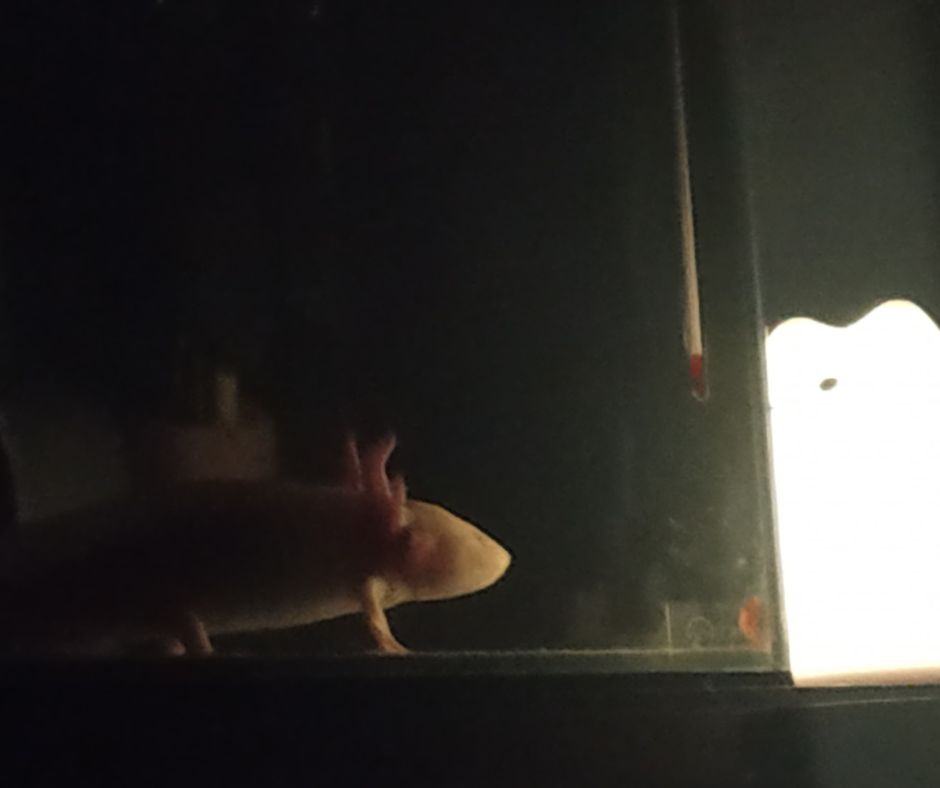
In the wild, Axolotls are prone to sleeping during the day and being active during the night to hunt for their food. Hence, they are nocturnal.
However, this habit might change in your aquarium habitat depending on how you keep them and will prompt them to sleep during the night during the darkest periods.
For instance, if you feed them in the morning, they’ll sleep at night. However, they may look pretty inactive in the daytime, and that should not worry you since it is their instinct to sleep during the day.
Also read: Are Axolotls Nocturnal? 3 Interesting Facts About Its Active
Do Axolotls Need Light at Night?
Axolotls are native to darker waters than your aquarium habitat, so they will not need light in the night.
Axolotl does not like lights, so if you consider lighting your tank habitat, the light should be dim as possible.
Unfortunately, Axolotls have poor eyesight; they do not have eyelids and are sensitive to light, so they prefer dim light.
But, while establishing the tank for your Axolotls, consider setting up dark spots for them to hide and brightly lit areas for live water plants. The tank should also be far away from direct sunlight.
Also read: 3 Best Axolotl Aquarium Setup Ideas
Do Axolotls Like Darkness?
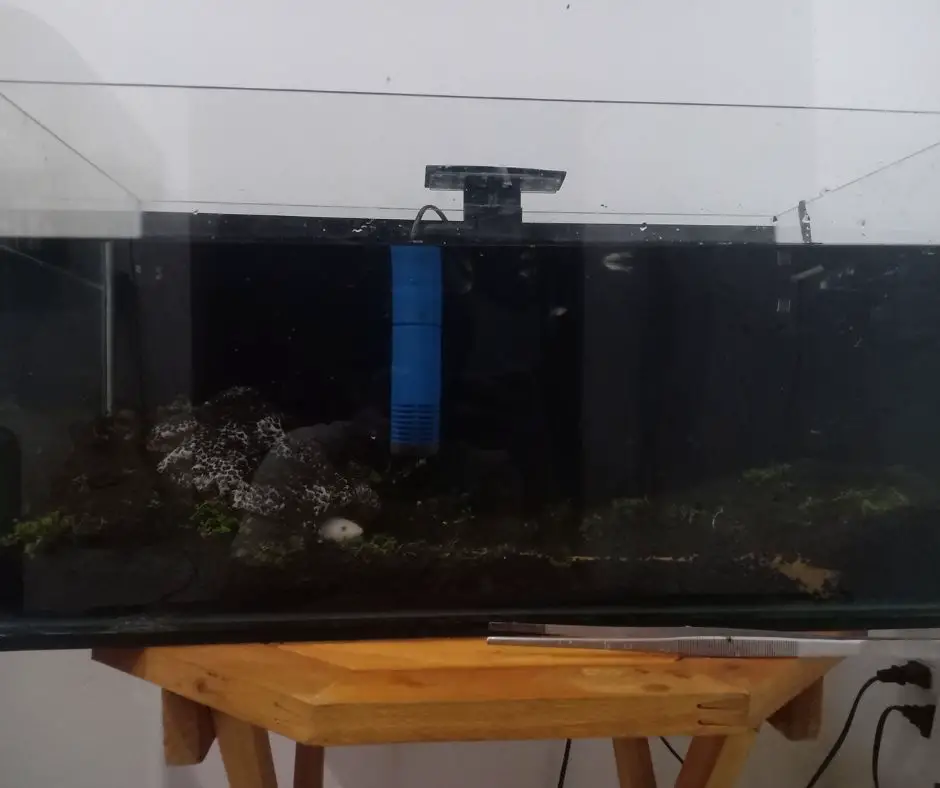
Yes, they do. Axolotls naturally prefer darkness because they are native to the dark waters at the bottom of the lakes and their eyes lack eyelids; as a result, they are sensitive to light.
You must ensure there are many dark places in the tank for axolotls to hide in case it’s brightly lit for water plants. Indisputably, consider putting off the lights at night.
Do Axolotls Sleep With Their Eyes Open?
Yes, of course, they will sleep with their eyes open for their entire life since they lack eyelids to close their eyes while asleep or at rest.
For that reason, you will find it difficult to distinguish a sleeping Axolotl from the look of their eyes. That’s why you will need additional clues.
The visible things you notice are; they will stay in one place for a while, and their body color will pale with fewer gills movement, unlike when they are awake.
As a result, when you see such signs, do not disturb or startle axolotls with loud noises or lights that disturb them until they get awake.
Do Axolotls Sleep Upside Down?
No, Axolotls do not sleep upside down because they are used to sitting at the bottom of the tank and do not engage in other activities.
Should you find them being upside down, then that should worry you since there is a likelihood they are sick or hungry.
Axolotls usually sleep in their usual position, just like when they are swimming in the tank when their bodies are still and not moving their gills.
Check with your vet as soon as possible why your Axolotls are upside down because they do that on occasions such as when infected with diseases or during compaction.
Also read: 8 Axolotl Dying Signs (and Some Treatments)
Aqueon Aquarium Starter Kit with LED Lighting
- All the equipment needed to get started in one box
- Kit includes: glass aquarium, low profile LED hood, QuietFlow power filter, filter cartridge, submersible preset heater, premium fish food sample, water conditioner sample, fish net, thermometer and setup guide
- Preset heater will keep your aquarium temperature at a constant 78 degrees, appropriate for most tropical fish
- Low profile full hood contains vibrant cool white LED lighting to bring your aquatic environment to life
- Filter has a red LED light that flashes to indicate when it’s time to change the cartridge
Last update on 2022-12-30 / Affiliate links / Images from Amazon Product Advertising API
Where Do Axolotls Sleep?
When Axolotls are sleepy, they will move to a familiar, calm, dark, and safe area to sleep, especially at the bottom of the tank. Typically, they will remain still during this time until they are awake.
If you do not have decorations in your tanks, axolotls will also sleep anywhere, mainly above the substrate or next to the plant.
How Long Do Axolotls Sleep?
In general, Axolotl sleeps for several hours at a time. Albeit, this amount of time Axolotls sleep depends on some factors such as their age, size, weight, and health status.
Axolotls are crepuscular; they will be active around dusk, dawn, or twilight. It is nice to assume that when they’re inactive during the darkest periods of the night, they are asleep.
The twilight usually lasts for about 20 – 30 minutes; this means an axolotl should sleep for up to 8 – 11 per night.
The definite way to tell is by closely monitoring them over some time. The best way is by tracking and analyzing their movement and behavior patterns.
How Do You Tell Your Axolotl Is Sleeping or Sick?
I am sure you will find it difficult to tell if your Axolotl is asleep or unwell since it sleeps with eyes open. Fortunately, a sleeping Axolotl will show a few signs.
For instance, retreating into a quiet place with less movement of their gills, be still and become pale in color. A sick Axolotl will refuse to eat and show signs like discoloration and lethargy.
Additionally, it will float on its side or upside down, or unwilling and do not move from the bottom of the tank and swim frantically. As a result, you should consult your vet immediately.
Also read: Why Is My Axolotl Floating?
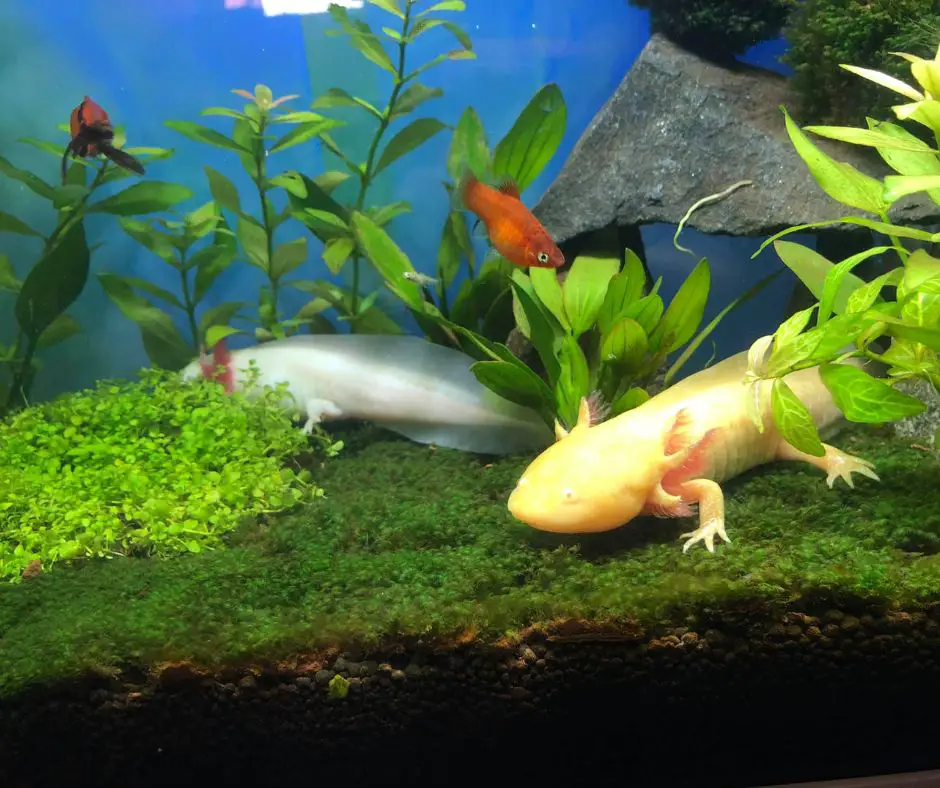
Tips to Ensure Axolotl Get Enough Sleep
To ensure your pet has enough sleep, you must ensure the environment is conducive and optimized to ensure they get as much sleep as possible regardless of how much time it will sleep.
You should keep in mind that it has some specific needs and requirements so that it’s not stressed up. When it’s under stress, it will be unwilling not to sleep.
That said, sleeping is a time of significant vulnerability and does not require energy only; below are some tips to ensure it gets sufficient sleep.
- You should put your Axolotl’s tank in a safe, quiet room area. This will be similar to their natural habitat (at the bottom of deep waters free from direct sunlight).
- Provide sufficient hiding spaces and plants. This will make them feel safe while sleeping since they will be free from disturbances.
- Provide a filter. To ensure that you maintain clean water in the tank; – free from dirt, wastes, and other materials.
- Ensure the temperature is optimum, e.g., around 60 – 640 Fahrenheit. High or low temperatures will make your Axolotl have stress.
- You should provide a sufficient, nutritious, and high-quality diet for your Axolotl. This is to ensure it has good health status.
- Avoid poking, touching, or interfering with your Axolotl more often. It is delicate and gets upset when you handle it more often, which will bother its sleep.
- Avoid cohabiting your Axolotl with other animals in the tank. It best thrives alone and does not need the company of other animals like fish.
MODERNJOE’S Stone Cave Shelter Hiding
- Integrates in any type of terrarium with a natural look. Very stable, not easily tipped over by larger reptiles
- Easy to clean and maintain. Durable resin construction means that it can easily be washed and sterilized.
- Realistic rock like textures that provides reptiles secure/hiding shelter and help reduces stress.
- Provides privacy, Prevents and reduces stress. Provide a humid microclimate for shedding, hiding, or egg laying
- Suitable for all types of tortoises, snakes, amphibians, spiders, scorpions, snakes, frogs, chameleons, tree frogs, geckos or small animals.
Last update on 2022-12-29 / Affiliate links / Images from Amazon Product Advertising API
Wrapping Up
To wrap up, Axolotls also require time to rest, just like any creature. Their sleeping habits are quite different and exciting, they do not have eyelids, so they sleep with their eyes open.
Understanding these peculiar traits, needs, and requirements are crucial to keeping Axolotls successfully and being passionate about them.
I believe this article has put you closer to distinguishing normal behavior and abnormal behaviors, which will cause you to worry should you spot them. In particular, the sleeping patterns in Axolotls.
Also read: Understanding Your Pet: 12 Common Axolotl Behaviors
